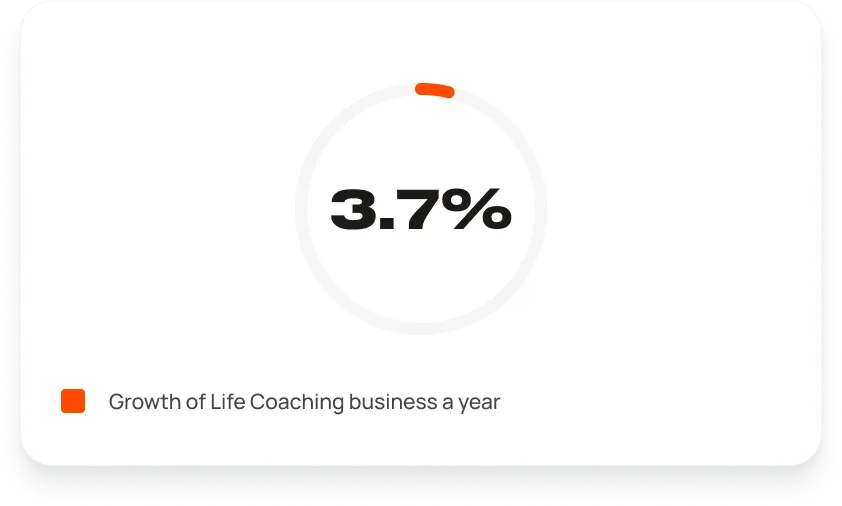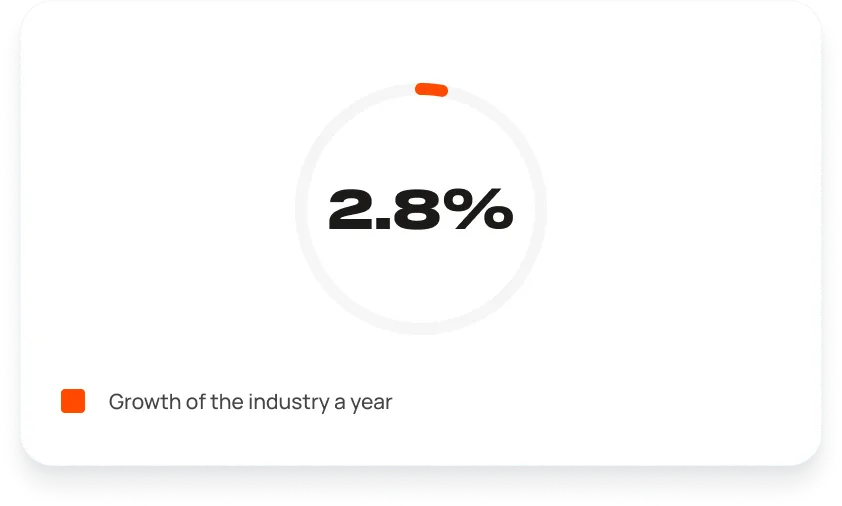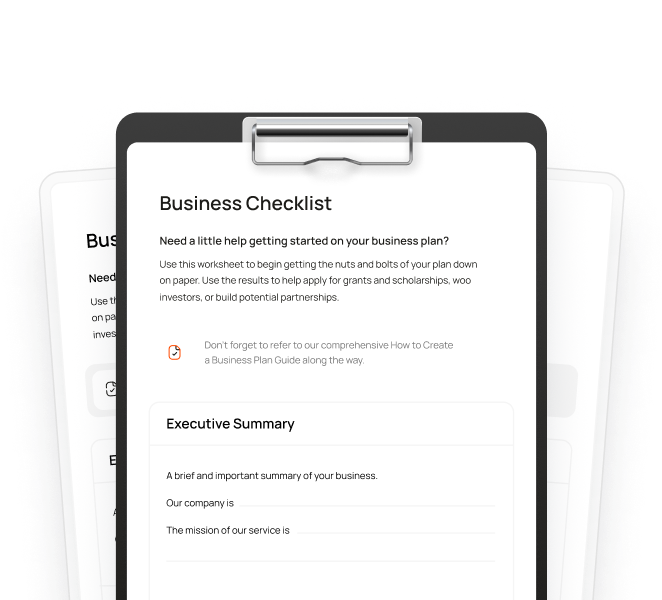
Join 1,000,000+ Entrepreneurs like you
Entrepreneurship is booming – and we're happy to be one of America's fastest growing companies.
On this page
What Type of Professional Coaching Business Should You Start?
There are several different types of life or business coaches. Here are some of the more popular options:
Family and Relationship Coaching
This type of life coaching focuses on helping clients deal with family matters and improve their interpersonal relationships. There’s likely to be a fair amount of counseling involved.
Life Potential Coaching
People seeking out this type of coaching want to build a strong foundation to improve their future opportunities and prospects. It provides advice on realizing strengths, overcoming weaknesses and giving people the self-confidence to achieve their goals.
Fitness and Lifestyle Coaching
You can help your clients change their attitude to food, nutrition, exercise and healthy living. This type of coaching requires a good understanding of exercise science, in addition to helping clients make everyday healthy choices.
Executive Productivity Coaching
Executive Productivity Coaching
Business Financial Coaching
This type of coaching requires a good understanding of accounting and finance, and it can be focused on various areas like profit margins, cost reduction and changing perspectives about money.
Executive Relationship and Culture Coaching
Another specialized type of business coaching, this focuses on strengthening interpersonal relationships, enhancing management styles and building organizational strength and culture.
Validating Your Professional Coaching Business Idea
Remember, the ideas above are just a starting point. You can define and tweak exactly what type of life or business coach you want to be through conducting your own research.
Identify your coaching business’ unique selling points (USPs)
Whether you’re competing on your niche, results, pricing or something else, your USPs set you apart from other coaches and encourage clients to come to you.
Understand your market
Clearly identify exactly who your clients are likely to be through the niches you serve. This will be essential to your marketing, communications, sales and client support.
Look at who your competitors are in the space
Having competitors is a good thing as it shows there’s a market. Look into the other coaches operating in your niche and area.
Talk to clients
Speak with potential customers to understand what they want from your coaching services, and validate this by asking if they would commit to spending real money on them.
Your Life or Business Coaching Business Needs a Plan
You need to define how you’re going to run your coaching business, market yourself, get sales, make a profit and grow. This can only come about through creating a watertight business plan. It will help you get your thinking in order and show your commitment to your life or business coaching company.
You will need to look at financial projections for your coaching business. What are your expected sales and revenues? What is your profitability? How much money will you keep in the business to grow it? How much will you pay yourself and others?
Business plans do vary slightly, but they should all cover the following areas:
An executive summary with the most important points from your business plan
Your goals and what you hope to achieve with your coaching business
A description of your life or business coaching niche, background information and context
A market analysis and likely demand
An overview of how your life or business coaching organization is structured
Your business model
How you will market and sell your offerings
Financial projections, revenue and profitability
Appendices
We’ve got the perfect guide to writing your business plan.
Right
Business
Structure
Setting up Your Life or Business Coaching Operations
Once you've legally created your coaching business, you’ll need to get some other things in place.
Location of Your Coaching Business
Almost all coaching entrepreneurs can work from home, although you may need a dedicated space to meet with clients (or you may want to travel to their home or business location). This is great as it reduces your office costs considerably. Don't forget that if you work from home, you can write off part of your utility and housing costs against your taxes.
Marketing Your Coaching Business
Marketing will be a huge part of your coaching business. Naturally, you will need an awesome website, but you'll also need to get branding, newsletters, digital ads, social media accounts and other channels in place.
Fitness and Lifestyle Coaching
You can help your clients change their attitude to food, nutrition, exercise and healthy living. This type of coaching requires a good understanding of exercise science, in addition to helping clients make everyday healthy choices.
Equipment for Your Coaching Business
It’s likely that the only equipment you will need to run your life or business coaching venture is a computer, laptop, tablet or smartphone. You will also want to invest in a wardrobe that keeps you presentable for client meetings.
Software and Processes
Life or business coaching entrepreneurs make extensive use of software; see our great list of the top apps at the end of this guide.
Life or Business Coach Qualification, Certification and Training
It will likely help you to prove your expertise as a life or business coach with the right qualifications. Types of qualifications and certifications will vary depending on your chosen field.
The Complete "Start Your Business" Checklist
A Clear and Comprehensive Guide to Starting Your Business the Right Way
Rules, Regulations and Taxes for Your Coaching Business
You will need to explore local, state and federal licenses and permits, and we can also help out with researching your business licensing needs.
Taxes for Professional Coaches
Taxes are a fact of life if you’re in business, and there are various ways you will need to file and pay them. This can include self-employment tax, state income tax and federal income tax. Depending on where and how you’re selling products and services, you may also be liable for sales and use tax.
As a rule of thumb, we recommend holding back around a third of your earnings to pay your taxes. We can also prepare and file your tax returns for you.
Maintaining Your Professional Coaching Organization
There are certain forms and legalities you need to follow to keep your life or business coaching business in good standing.
File an Annual Report
Depending on the state you’re located in, you will probably have to file a report every year. This report tells the state about any major changes to your business, and we can file your Annual Report on your behalf.
Pay estimated taxes
You will be expected to pay estimated taxes on what you plan to earn in the current business year. Typically, you will need to pay estimated taxes in April, June, September and January (of the following year).
Renew Business Permits and Licenses
Your federal, state, regional and city licenses and permits may need to be renewed on a regular basis, typically once a year.
File your taxes
You will need to file your taxes once a year.
Pay payroll and sales taxes
If applicable, you will need to make payroll and sales tax payments on a regular basis.
Prepare Your Taxes
You will need to work with your accountant to prepare all the taxes you need to pay.
Insurance for Your Professional Coaching Organization
Most life or business coaching organizations should have comprehensive business insurance. There are various types.
Workers Compensation Insurance
Workers’ compensation insurance provides coverage for job-related illnesses, disabilities or injuries that affect employees. Regulations for this insurance vary from state to state. It typically covers areas like medical costs, loss of earnings, compensation and retraining.
Home and Auto Insurance
If you are working from home on the administration of your coaching business or driving a vehicle for work, check whether your existing home and auto policies cover you for work use of your home or car. If not, you should either expand your policy so you’re covered or get dedicated business insurance.
General Liability Insurance
This insurance protects your coaching business from claims due to being sued. This may include injury to members of the public, property damage, personal liabilities, legal defense and more. It can help protect your business from financial penalties and bankruptcy.
Useful Online Tools for Professional Coaches
Here are some really great online tools for managing your life or business coaching business. They will reduce the time you spend on administration, help you to collaborate with others and free up your time to grow and manage your new venture.
Project Management
Collaboration
Social Media Management
Communication
Email Marketing
Advertising
Marketing Automation
Customer Relationship Management (CRM)
Human Resources
Website Development
Analytics
Hiring
Please note: This page contains affiliate links and we may receive a commission if you make a purchase using these links.
Conclusion
Helping other people make positive changes in their life or business is an amazing service. If you can find a great niche,
understand your competitors and put together a solid business plan, you will have every chance for success.


